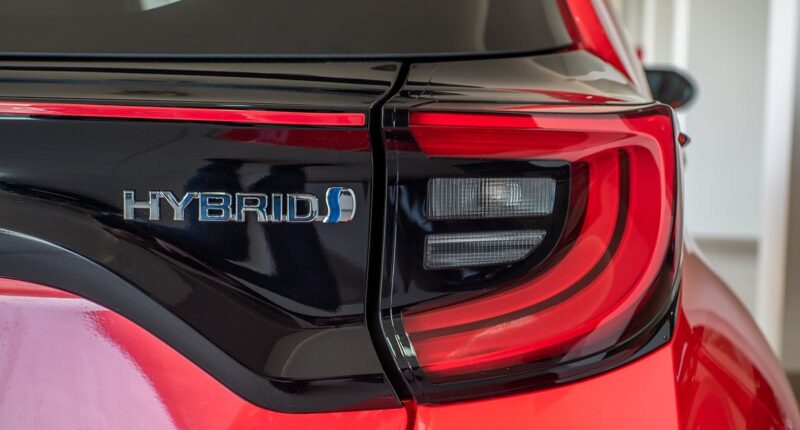Sir Keir Starmer has been forced to back down on the government’s electric car targets, as he moved to protect the UK’s automotive industry in response to Donald Trump’s 25 per cent tariffs on US vehicle imports.
Unveiling his ‘plan to support carmakers’ on Sunday evening, he dramatically watered down the ban on sales of new petrol and diesel cars and vans.
The Prime Minister also provided more lenience to manufacturers tasked with meeting binding EV sales targets set out in the Zero Emission Vehicle (ZEV) mandate.
While the PM said he has now officially rubberstamped the 2030 ban on sales of new combustion cars, there are a number of exemptions that make the deadline far less hard-hitting.
The biggest is that hybrid cars – both conventional and plug-in – have been given a five-year stay of execution until 2035.
White van men around the country will also be celebrating this morning as new petrol and diesel vans will stay on sale until the middle of the next decade.

Alternative: The Government has confirmed that both conventional ‘self-charging’ hybrid and plug-in hybrid new cars will remain in showrooms until 2035
Speaking last night, the Prime Minister said: ‘Global trade is being transformed so we must go further and faster in reshaping our economy and our country.
‘I am determined to back British brilliance. Now more than ever UK businesses and working people need a Government that steps up, not stands aside. That means action, not words.’
Want to know what these changes mean to you? This is Money has outlined five major updates that will impact British drivers…
1. Britons will be able to buy hybrid cars for longer
Hybrids have long been seen as a stepping stone to driving fully electric. They give drivers some zero emissions running but a petrol engine when long mileage journeys are called for.
And the good news for buyers who aren’t yet ready to switch to an EV is that you can now buy a hybrid for another five years after new conventional petrol and diesel car sales have been outlawed.
The government’s new regulatory leniency will now allow hybrids to be sold between 2030 and 2035.
However, it’s only for full hybrids and plug-in hybrids (PHEVs).

Plug-in hybrids commonly have a larger battery than a conventional hybrid and can be charged via the mains, a wallbox or public device. Both types have been granted a 5-year stay of execution beyond the 2030 ban on sales of new petrol and diesel cars

Mild hybrids are the latest form of ‘hybrid’ car to hit the market. However, at no time does the system power the wheels like an HEV or PHEV. Therefore, these will be banned in 2030
In case of uncertainty a plug-in hybrid, like the Ford Kuga PHEV or Range Rover Evoque PHEV, requires you to plug the car into a charger to replenish the battery for zero emissions driving, in the same way as a fully electric car.
Many PHEVs these days can do more than enough EV-only miles than weekly commuting needs: the Volkswagen Passat (1.5 TSI eHybrid Life) we reviewed last year for instance has a massive electric-only range of 81 miles.
A full hybrid, also known as a ‘self-charging’ or ‘conventional’ hybrid, like the Nissan Qashqai e-Power and Toyota Prius, combines petrol and electric power but doesn’t need to be plugged in.
Because these have much smaller batteries, they can only be driven exclusively under electric power for short distances.
Mild-hybrids – which have very small batteries that do not ever power the wheels – will be outlawed along with traditional new petrol and diesel cars in 2030.

Speaking last night, the Prime Minister said: ‘Global trade is being transformed so we must go further and faster in reshaping our economy and our country.’ Among these transformations is watering down Labour’s electric car targets
2. New car buyers won’t have to go electric in 2030
Due to the relaxation to the rules and hybrids being allowed beyond 2030, new car buyers now won’t be forced to go electric until 2035.
However, Britain’s drivers might suffer whiplash from the constant back and forth regarding when showrooms will exclusively offer EVs.
The Tory government originally introduced the 2030 ban on new petrol and diesel car sales in 2020 under Boris Johnson before Rishi Sunak – just three years later – extended it to 2035 in response to trailing public demand for electric vehicles.
Identifying this as an easy win for its election manifesto last year, Labour proudly announced it would reinstate the initial 2030 date for new petrols and diesels to be ousted.
However, since Keir Starmer came into power there has been little confirmation or clarity on restoration of the 2030 deadline – somewhat devaluing Labour’s hardline stance.
This included a consultation launched earlier this year by Transport Secretary Heidi Alexander to gauge response from industry regarding hurdles faced having seen a national – and global – downturn in EV sales in recent months.

The ZEV mandate is designed to force car makers to sell an increasing volume of EVs between now and 2035. However, Keir Starmer overnight rang in a number of flexibilities that will allow manufacturers to meet rising thresholds
3. Less petrol car ‘rationing’
The ZEV mandate, introduced to law last year, has been a major bugbear for carmakers in recent month.
It outlines a minimum EV sales share for manufacturers each year until 2035, rising annually towards the government’s wholesale ban on new petrol and diesel cars and vans in a decade’s time.
Failure to adhere to these targets have come with the threat of sizable fines.
This saw some brands – notably Ford – suggesting last that that it could ‘ration’ the availability of its petrol cars in an effort to force buyers to choose EVs, artificially inflating its green vehicles sales in order to meet ZEV targets and avoid financial punishment.
However, a host of flexibilities to the mandate rules overnight means car makers are highly unlikely to need to hold back availability of more popular combustion models to avoid fines.

Martin Sander, general manager at Ford Model e Europe, last year suggested the company could restrict the availability of new petrol cars to encourage EV take-up to meet ZEV targets
While the government hasn’t gone as far as adjusting the increasing annual thresholds – meaning manufacturers must still achieve a 28 per cent EV mix this year and 80 per cent by 2030 – it has made it easier for them to achieve compliance.
This includes allowing makers to offset sales of non-EVs by exceeding their CO2 reduction targets, and to use a credit-transfer system until 2029 that gives huge manufacturer groups (such as Stellantis, which owns Citroen, Fiat, Peugeot, Vauxhall and more) the option to bail out underperforming brands under their banners that have fallen behind the EV-mix requirements.
A scheme to allow makers to ‘borrow’ EV sales credits from future years has also been extended from 2026 to 2030, and manufacturers will be able to trade credits between cars and vans under a new stipulation.
The ZEV mandate rules have been watered down with so many flexibilities that ‘very few fines will have to be paid’, the Department for Transport says.
Those that do still fall foul of fines also won’t have to pay as much.
That’s because Labour has also slashed these by 20 per cent from £15,000 to £12,000 for cars, and by 18 per cent (from £18,000 to £15,000) for vans.
The reduced risk of fines also means manufacturers facing these penalties are now unlikely to pass higher costs on to consumers via increased vehicles prices.

Supercar makers, including Aston Martin, Bentley and McLaren – as well as niche brands such as Caterham and Morgan – have been allowed an exemption from both the 2030 ban on new petrol cars and the ZEV mandate targets in news that will be welcomed by petrol heads
4. You can still buy petrol supercars beyond 2030
Another adjustment to EV targets introduced by Government overnight is that small and micro-volume manufacturers will be exempt from the mandate targets and the 2030 ban on new petrol car sales.
This will be welcome news for brands such as McLaren and Aston Martin which focus on low volume and bespoke designs for ultra-high network buyers.
Aston Martin boss Lawrence Stroll has been particularly vocal about the Warwickshire brand’s plans to continue selling petrol cars for as long as possible as there will ‘always’ be demand for sports cars with petrol engines – such as its V8 and V12 models.
Last year he said: ‘We will continue to make [petrol cars] as long as we are allowed to make them. There will always be demand, albeit that will shrink.’
But it’s not just famous luxury car makers though that will benefit from this.
The SMMT’s Low Volume Manufacturers Group (LVMG) – previously called the Specialist Car Manufacturers Group – includes Allied Vehicles, Aston Martin, Bentley, Caterham, Dare, Elemental, LEVC, Lotus, McLaren, Morgan, Pilgrim, Radical, Rolls-Royce and TVR.

Lawrence Whittaker, CEO of The Lister Motor Company, had previously said that small manufacturers are in ‘stalemate’ until the Government gives clarity on its ZEV position
In January, This is Money reported how British marques such as Caterham and Morgan had been left at a ‘standstill’ not knowing whether ZEV targets apply to them or not.
At the time Lawrence Whittaker, CEO of The Lister Motor Company, which dates back to 1954, said small car manufacturers were putting ‘all future plans on hold’, as they cannot make investment decisions if they don’t know whether they will remain exempt.
Lister’s plans to create a brand-new car for the road – its first new model in 32 years – were put on hold because there was ‘no clarity on the future rules for IVA or SVA Type Approval cars’.
Whittaker welcomed the news overnight but said it still provided no clarity on exemptions beyond 2035.
‘Given how long it takes to develop and bring a new car to market, this could limit the time we have to sell new models if the exemption isn’t extended,’ he posted on LinkedIn.

While sales of new petrol and diesel cars will be banned in 2030, there will be no such restrictions on vans. It means white van men can continue buying diesel until 2035

The news could be a hammer blow to Vauxhall’s EV-only van plant in Ellesmere Port and will likely hit sales of fully electric vans on the market today, including Ford’s e-Transit (pictured)
5. White van man can keep buying diesel
In a victory for tradesmen and women and small business owners across the UK, the government has confirmed it will grant new petrol and diesel vans a free pass until 2035.
Sales of new small commercial vehicles with purely combustion engines under the bonnet were expected to be outlawed in 2030 along with passenger cars, but minsters have announced that petrol, diesel and hybrid vans will all be permitted until 2035.
The only restriction manufacturers face is that they must ensure that between 2030 and 2035 the overall CO2 emissions of their non-electric fleet get no worse than they were in 2021.
Given the advances in cleaner engine technology and hybridisation, this should not be an issue for van makers.
The news could be a hammer blow to Vauxhall’s EV-only van plant in Ellesmere Port and will likely hit sales of fully electric vans already on the market today, including Ford’s e-Transit.


















